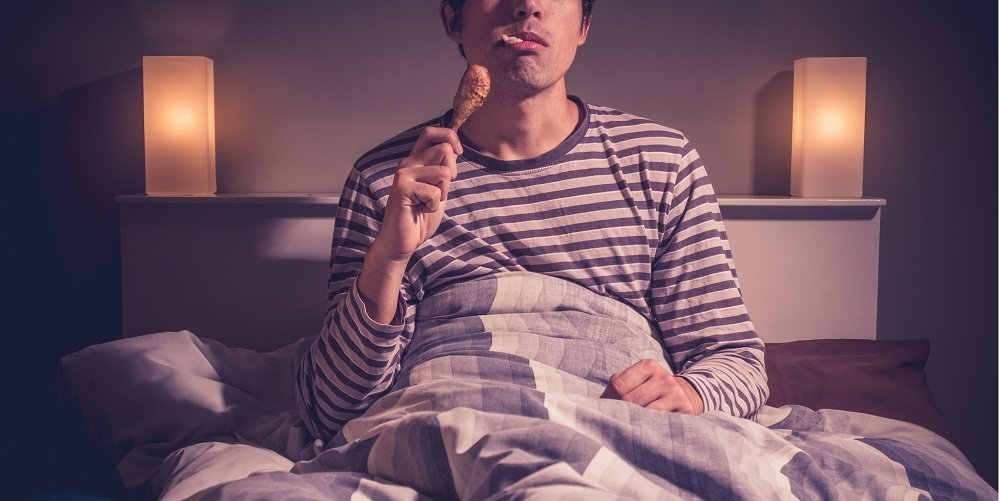Don’t eat after sunset – lest you want to gain weight.
It’s a caveat you may have heard many times before. You may have heard it from your mother, friend, co-worker, gym buddy, professor, or even your child. Unfortunately, for your well-meaning loved ones, nothing could be more wrong.
Granted, eating at night can and may make you gain weight like crazy, but it’s usually not for the reasons you may have been indoctrinated to think. Let’s get to the bottom of this nocturnal fear-mongering, shall we?

Where The Myth Started
Perhaps the belief that night-eating causes weight gain stems from the tendency of people to abandon portion control and expand their food choices at dinner. In the evenings, people tend to gorge on such empty calories as junk food, abetted by such diversions as watching television or sitting in front of the computer. The choice fare in these activities usually consists of candies, chips, chocolate, cookies, ice cream, and pizza. These calories can add up quickly, with you unwittingly putting copious amounts of them into your mouth while engaging in passive entertainment.
Also note the gap between lunch and dinner, which is longer than the break between breakfast and lunch. If you don’t indulge in some healthy snacking by the time dinner comes around, you will have felt famished and consequently been tempted to break self-imposed calorie limits. Dinner also comes at a time when most people are just being let off work, at an hour when they are too tired to cook anything at home. Fast food joints and other eateries that serve unhealthy fare could easily become fallbacks then.
With all these reasons and more, it’s easy to see how the notion of night eating as a fattening habit started.
In Reality

But the fact remains that the amount of calories you take in determines your gain of weight, not the timing thereof. With all due respect to nutritionist Adelle Davis, who famously exhorted people to “eat breakfast like a king…dinner like a pauper,” the prevailing science today is less about minding the schedule of your diet but controlling your caloric intake and expenditure through a balanced diet and physical activity. The body will not hold on to more fats from an 8 pm supper than one taken at 4 pm.
While it’s true that metabolism slows down at night, it’s a fallacy that the body would use up fewer calories then. Many basic bodily processes are involuntarily occurring at night, and because of them, you will still burn calories. If anything, there’s a good chance you would burn less calories during your waking hours, when you are sedentary and doing nothing but gluing yourself to the computer screen, in the comfort of your office chair.
Don’t believe us? In a 2006 study by Oregon Health and Science University researchers, rhesus primates that consumed the bulk of their diet at night were no more susceptible to weight gain than their counterparts who fed earlier.
Also See: 10 Worst Foods to Eat in the Morning
Merits
Then again, there are still merits to not eating at night. Putting your meals too close to slumber may foreshadow indigestion and interfere with sleep.
You can still schedule your meals, insofar as you space out your meals every two or three hours. Nutritionists would recommend this technique to ensure your metabolism does not cling on to your fat stores more than it should. All told, don’t be scared about eating food at night.








